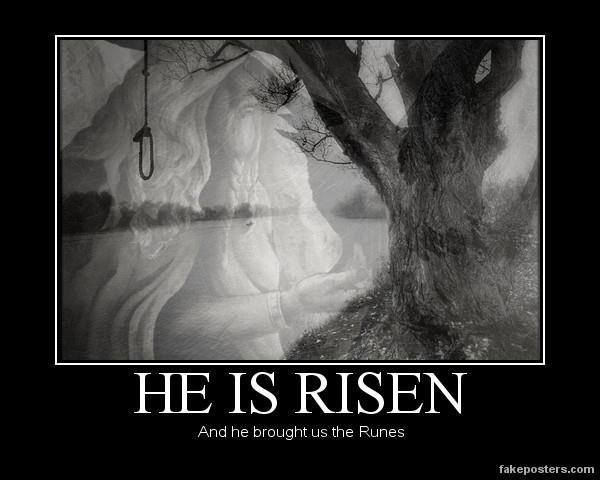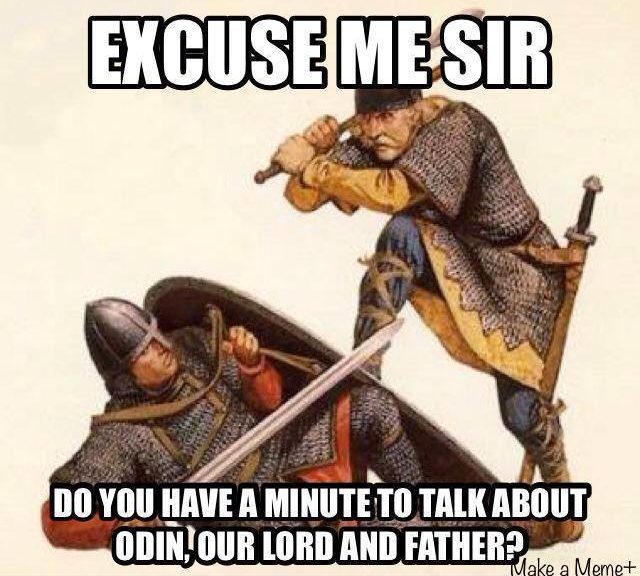Eostre and Spring: Is Easter a Christian Holiday?
 Every year about this time, Heathens, pagans, and those who don’t celebrate the Christian holiday of Easter are quick to point out that Easter isn’t a Christian holiday; yours truly included. But I do wish to address Easter as a Christian holiday, even if it has taken its name and customs from pagan celebrations.
Every year about this time, Heathens, pagans, and those who don’t celebrate the Christian holiday of Easter are quick to point out that Easter isn’t a Christian holiday; yours truly included. But I do wish to address Easter as a Christian holiday, even if it has taken its name and customs from pagan celebrations.
Easter as a Christian Holiday
I’m talking about Easter first as a Christian holiday so we can distinguish between the Christian holiday and a pagan celebration. Despite the name, Easter, the holiday has its roots in the Jewish celebration of Passover.
If you’ve ever watched The Ten Commandments with Charlton Heston, you know that Passover celebrates the flight of the Israelites from the Pharaoh’s oppression as described in the Book of Exodus in the Bible. Never mind that archaeologists are pretty sure that the pyramids were built by paid labor and not slaves. Furthermore there are no records by the Egyptians of Israelites in Egypt, let alone slaves.
Jesus purportedly entered Jerusalem for the week of Passover, which, for his troubles, ended up getting him nailed to a cross.
Why Easter is Primarily Christian
 Now, before we go into all the pagan traditions surrounding Easter, I’m going to point out that despite my dislike of Christianity and its destruction of paganism, pagans can only superficially claim Easter because it is around the Vernal Equinox. The whole fairy tale of the “purportedly magic Jew” rising from the dead after being crucified is more or less their shtick. It happens around the time of Passover, which is based on the Book of Exodus in the Bible.
Now, before we go into all the pagan traditions surrounding Easter, I’m going to point out that despite my dislike of Christianity and its destruction of paganism, pagans can only superficially claim Easter because it is around the Vernal Equinox. The whole fairy tale of the “purportedly magic Jew” rising from the dead after being crucified is more or less their shtick. It happens around the time of Passover, which is based on the Book of Exodus in the Bible.
I can hear you saying “But Tyra, what about the other resurrection myths? What about the celebrations of Dionysus and Osiris? What about Beltane? And what about Odin hanging from Yggdrasil for nine days?” Yeah, yeah. All that is true and chances are the Christians stole the ideas from pagans, but the whole bullshit celebration of Easter is undoubtedly theirs. They wove the pagan stories together to fit their religion and there you have it, a Christian story.
Nothing is particularly new with the Jesus story. There have been many instances in religion of gods becoming men or appearing to be men. There are many instances of gods being crucified or hanged from trees. And there are plenty of instances of men or gods rising from the dead and becoming more powerful. The Jesus story is just a narrative that puts those elements together in a one god, Christian fashion.
But Easter is Pagan! Right?
Easter isn’t as pagan as Christmas. Sure, it takes elements from various beliefs and spins them into a story that has both familiar and new elements present. The story uses archetypes that  are ingrained in our psyches. But it is a Christian story. Why? Because it doesn’t quite mimic any other pagan myth out there.
are ingrained in our psyches. But it is a Christian story. Why? Because it doesn’t quite mimic any other pagan myth out there.
Before Easter, pagans may have celebrated the equinoxes, although the solstices seem to be more popular for obvious reasons. Imbolc was the Celtic version of Entschtanning (celebrated by those in Urglaawe) also known as Grundsaudaag, which happened around the first or second of February, which we now celebrate as Groundhog’s Day. Beltane was the Celtic version of Mayday, which celebrated the beginning of summer. As Heathens, we really didn’t have an Equinox celebration, as far as I know.
Although St. Bede mentions the Anglo Saxon month of Eostre, which is named after Eostre/Ostara, we know very little about Eostre. She had a feast day around the same time as Easter, which probably made the whole Christ thing more palatable. The fact that Eostre gave Easter its name is probably one more way the Christian church co-opted Pagans.
What About the Pagan Trappings Around Easter?
 Sure, Easter took on the pagan trappings of Eostre/Ostara. No bunnies were visiting Christ on the cross, as far as we know. And while eggs are purported to be the symbol of rebirth among the Jewish peoples, I haven’t done enough research into that to back that up. But you can read about my opinions, Was Easter Appropriated? HERE.
Sure, Easter took on the pagan trappings of Eostre/Ostara. No bunnies were visiting Christ on the cross, as far as we know. And while eggs are purported to be the symbol of rebirth among the Jewish peoples, I haven’t done enough research into that to back that up. But you can read about my opinions, Was Easter Appropriated? HERE.
Ignoring Easter
This year I nearly forgot about Easter except my husband had the day off. And to be point-blank honest, I was more concerned about avoid talking to my Christian family that day instead of anything special. So, our dinner was stir-fry venison. Because that’s a proper Eostre dish. I’m just saying…
This doesn’t mean that you can’t celebrate Eostre bunnies and stuff yourself full of Cadbury eggs. The whole candy thing was a 19th century invention anyway to give candy makers a boost, so it’s not religious at all. Personally, I’m good with any holiday that promotes candy.



